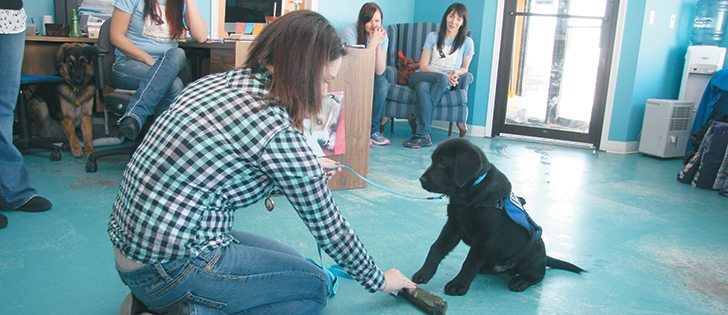Pawsitive Independence, a non-profit group in Saskatchewan, trains three dogs per year to assist autistic children
MARTENSVILLE, Sask. — A small non-profit group is seeking big benefits for children with special needs through its service dog training program.
Pawsitive Independence relies on an extensive network of volunteers to raise and train dogs that are matched with families and their children’s specific needs.
The group is currently focused on training dogs for autistic children but also plans to train a dog to help people with conditions such as post-traumatic stress disorder.
Lead trainer Kristine O’Brien said a service dog will require two and a half years of training before it’s ready to be placed.
Read Also

Students urged to consider veterinary medicine
Alberta government makes $86.5 million investment in University of Calgary to double capacity for its veterinary medicine program to address labour shortages in the field.
Dogs will be taught to alert the family by barking if the child bolts, nudge or lick a child to quell repetitive behaviours or tug to keep the child in one place.
“We start to make it more specific to the kid’s needs, depending on where they are on the autism spectrum,” she said, noting the training continues during the dog’s work life as the child’s needs change.
The child and dog will always be supervised.
“The dog is not to be used as a nanny,” said O’Brien.
She cited the current training schedule for Andy, an English labrador supplied by Kim Anderson’s Labradors of Dunrovin kennel at Borden, Sask.
It begins by choosing a healthy dog with the right temperament, she said.
“We do temperament and social tests to see how open they are to touch and human interaction,” said O’Brien.
Puppies that are ready to leave the breeder are placed with “puppy raisers” such as Amanda Gardner of Colonsay, Sask., until about four and half months old.
Gardner’s two active young children and a busy lifestyle will help the dog get used to family life.
She said she is a longtime dog person who wanted to help the program.
“When the opportunity came along to be involved, I couldn’t pass it up.”
Home training is “all day, every day,” she said of teaching simple commands like sit, wait and shake a paw.
Andy’s littermate, Annie, is currently spending her days in a school in Maymont, Sask.
More intensive training takes place later at O’Brien’s Paws Republic pet boarding and training centre in Martensville, where Pawsitive’s board of directors also meets and plans its fundraising efforts.
Pearl Gagnon, the mother of school-aged autistic boys Gabriel and Cole, said the dogs play a role in keeping children safe and giving them some independence.
Gabriel could use the dog to stop him from running away, while Cole could learn how to feed, care, train and possibly even show the dog when he’s not “at work,” said Pearl.
“It’s an opportunity for them to grow and have a purpose,” she said, noting it could provide life skills or employment opportunities later in life for Cole, a high functioning autistic.
“You can’t always see what the autistic child’s abilities are,” she said.
Gagnon felt the docile dogs are a constant companion that helps calm the child. The dog’s presence can also be a catalyst for conversation.
“They are often alone, watching from afar,” she said of the autistic.
“Hopefully, it will make therapies more beneficial, especially if they get the dogs earlier,” said Gagnon.
Joan Frehlich, Gagnon’s sister and Pawsitive’s vice-president and co-ordinator, said demand for dogs outstrips supply. Service dogs for the autistic are rare in Saskatchewan, but are more common in provinces such as Quebec and Ontario.
She said trained dogs can fit into a rural or urban environment.
“At the end of the day, they’re just working,” she said.
Frehhlich said guide dogs get regular breaks from work and are retired to family homes.
“A service dog has to be retired before it’s broken,” said Frehlich, citing instances where the dog’s body breaks down from wear and tear and age and when the child requires more from the dog than it can deliver.
She said the two-year-old Pawsitive program trains three dogs a year, but that number could grow with greater funding to supply service dogs and serve as resources for families with special needs children in Saskatchewan. It will also help work with dogs now in service in homes.
“You’re getting a dog that’s going to help your life,” said Frehlich.
She estimated the cost of training and buying one service dog at between $20,000 to $30,000.
Families manage the dog’s costs while in their care and buy pet insurance to help manage veterinary expenses.















